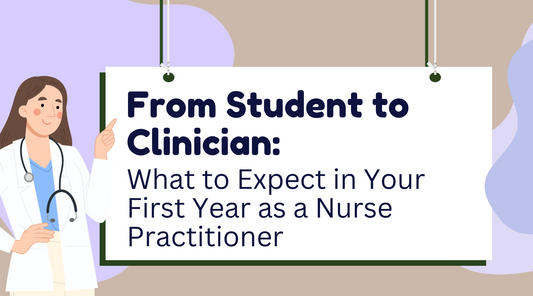Finding a qualified preceptor for your nurse practitioner (NP) practicum rotations can be one of the most challenging aspects of NP school. For many students, the search for a preceptor can feel like an unpredictable and stressful endeavor, especially when programs don't provide sufficient support. This process can be a source of anxiety, but with a little preparation, persistence, and smart strategies, you can streamline your preceptor search and significantly increase your chances of success.
Here are some valuable strategies that will not only help you secure a preceptor but also maximize your practicum experience.
1. Understand Your School’s Practicum Site Requirements
Before diving into your preceptor search, it's crucial to understand your school's practicum site requirements. Does your program accept a variety of healthcare providers, such as MDs, DOs, PAs, or NPs, as preceptors? Be sure to clarify these specifics upfront. Your school may also mandate certain specialties or types of clinical settings for your rotations. For example, as a Family Nurse Practitioner (FNP) student, your program may require clinical hours in specialties like Family Practice, Pediatrics, and Gynecology. Knowing these details in advance will help you target your search in the right direction.
2. Start Early and Have Backup Plans
Securing a preceptor can take longer than you might expect. Start your search early, ideally 12 months before your anticipated rotation, especially if you live in a competitive area. Many preceptors are booked well in advance, so the more time you give yourself, the better.
One big headache I encountered was not securing preceptors early enough, and I ended up scrambling to find one at the last minute. A friend of mine even had her preceptor cancel due to unforeseen medical leave just weeks before her rotation. Situations like this highlight the importance of having a backup plan. You never know when a Plan B may turn into a lifesaver.
3. Leverage Professional Networks
Professional networks are a goldmine when it comes to finding potential preceptors. Join organizations or local chapters of your state's NP association. These groups not only help you connect with experienced professionals who might be open to precepting but also provide great opportunities for education, networking, and professional development. Consider attending educational events, dinners, or conferences—these can often lead to valuable connections for preceptorship opportunities.
4. Utilize LinkedIn for Networking
As a nurse, I never used LinkedIn until I started my NP program—but I quickly learned how powerful a tool it could be for professional networking. Set up a LinkedIn account and use it to connect with NPs in your area. Don’t be afraid to reach out with a personalized message expressing your interest in securing a preceptorship. Even if the NP isn’t available to take on a preceptorship, they might offer you advice or point you in the direction of someone who can help.
5. Contact Local Clinics Directly
When it comes to finding preceptors, sometimes taking the direct approach is your best option. Visit or call local clinics, or send personalized emails expressing your interest in completing a preceptorship there. If face-to-face visits aren’t feasible, persistence via phone and email can help you stay top-of-mind. Even if your first attempt doesn’t work out, it's worth continuing your efforts—sometimes all it takes is one successful connection to open doors.
6. Tap into Your Personal Healthcare Connections
Sometimes the key to securing a preceptorship lies close to home. Explore personal connections you may have within your own healthcare network—whether it’s your own healthcare provider, a family member, or a colleague. These personal links can often help you land a rotation spot.
I know several friends who managed to arrange clinical rotations with providers they already knew, whether through personal relationships or having worked with them in some capacity. One of my toughest rotations to secure was with a pediatrician, but through a friend's connection from a past rotation at a nearby clinic, I was able to find a preceptor at the last minute, and even score a GYN rotation there too.
7. Explore Employer-Sponsored Preceptorships
Don’t overlook the possibility that your current employer may offer preceptorship opportunities for students within their organization. Some hospitals, clinics, and healthcare settings offer these programs as a way to support employees seeking advanced practice roles. Often, employees are given priority access if their institution is affiliated with an NP program.
For example, I was able to secure an Urgent Care rotation with my employer, despite having no prior connections. All it took was submitting an application and following up a few times—sometimes perseverance and initiative go a long way.
Conclusion: Plan, Persist, and Connect
The search for a preceptor can undoubtedly be daunting, but with the right approach, patience, and networking, you will put yourself in the best position to secure a valuable and educational practicum rotation. Take control of the process by starting early, understanding your requirements, and tapping into both professional and personal networks.
The preceptor search is one step on your journey to becoming a skilled and confident nurse practitioner—embrace it as an opportunity to learn, connect, and grow.
Good luck, and feel free to drop any tips or experiences you’ve had in securing preceptors in the comments below!
Have any questions or success stories to share from your own preceptor search? Let’s talk in the comments! 👇



